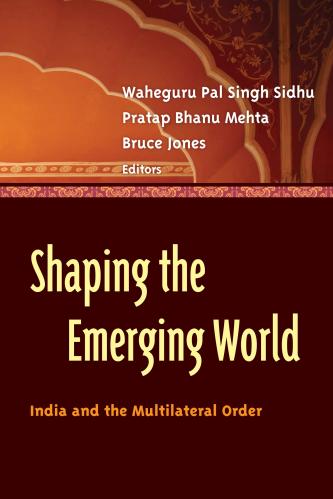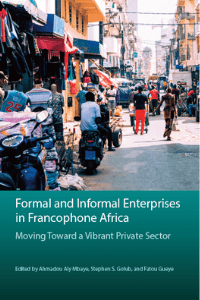Content from the Brookings Institution India Center is now archived. After seven years of an impactful partnership, as of September 11, 2020, Brookings India is now the Centre for Social and Economic Progress, an independent public policy institution based in India.
The chapter is part of a briefing book ‘India and Africa: Forging A Strategic Partnership’ edited by Dr. Subir Gokarn, Dr. WPS Sidhu and Shruti Godbole.
Over the last 15 years, there has been a significant change in the “ease of doing business” in Africa. Globally educated and exposed business and political leaders and bureaucrats have set processes in place, bringing peace, economic reforms, which have made many African countries easier places to do business than other faster growing Asian countries – resulting in a projected average growth of about 5% over the next decade, making it second only to emerging Asia.
I would like to share my views regarding the opportunities and challenges of doing business in Africa and how India should approach Africa.
Why Africa
- The last decade has seen improved macroeconomic stability across Africa, visible through large drops in inflation, government debt and exchange rate volatility-all encouraging signs for global Analysis and research suggest that the next two decades could see further improvement in macroeconomic and political stability providing the necessary impetus to economic development.
- Many African nations have instituted business-friendly reforms including telecom deregulation, tax cuts, power sector reform, land rights and others, encouraging MN Cs to invest and participate more in this growth story. Such reforms are expected to continue unfolding across the continent over the next
- Encouraged by higher returns on FDI compared to other emerging economies, private foreign capital flows to Africa have risen sharply since 2005 and will continue to in crease across several sectors notably resources, manufacturing and service oriented sectors such as information technology, communications, tourism, etc.
- Africa has more cities (more than so) whose population exceeds 1 million compared to India, and this number is expected to double by In fact, Africa and China share similar levels of urbanisation. By 2025, Africa is expected to be 47 per cent urbanised as compared to 40 per cent in 2013.
- Consumer spending is expected to increase by USD 2 trillion by 2025 driven by an 80 per cent increase in middle class households to around 190 million.
- Africa has a significant and under-explored share of global mineral reserves, e.g., Platinum Group Metals such as diamonds, bauxite, phosphate, etc., which will feed future global demand and hence be a key growth Africa would also continue to benefit from oil and gas.
- Almost 60 per cent of the world’s uncultivated arable cropland is in Africa, attracting significant FDI. Simultaneously, there exists huge potential of at least 30 to 50 per cent upside across Africa by improving
Hurdles for business in Africa:
- Fragmented opportunity: Each country in Africa is unique and differs across demographic profile, stage of development
- Managing unfamiliar risk: The lack of well-structured regulations creates an uncertain investment environment; there is political instability; in some countries managing “global risk” is still a new terrain for Indian companies
- Many nascent categories: Since Africa is still evolving, companies will need to shape/build themselves if they want to be early entrants to the market
- Infrastructure bottlenecks: Infrastructure development has not been able to keep pace with business needs
- Managing brands: This is a critical challenge as African consumers are highly brand conscious; need dedicated effort to develop presence of own brand in Africa
- Maturity of financial services:Financial instruments are still evolving; access to finance for individuals and enterprises is low in many countries due to low penetration of banks
- Managing talent deficit: Local talent is limited; investors need to bring their own people across hierarchies in the initial years till the local talent is nurtured
Suggested Success Factors for Indian Companies in Africa
Africa poses multiple challenges to Indian companies looking to invest there. Challenges in Africa are inherent to any emerging market and include a fragmented opportunity with unfamiliar risks, infrastructure bottlenecks, lack of talent and a nascent financial services sector. Apart from the sector specific initiatives, Indian companies will need to adopt 10 common imperatives identified by studying successful and unsuccessful MNC businesses in Africa.
- Prioritise early – Identify sectors and countries
- Embrace fabric – Understand local nuances and adapt business models Africa is one continent with 55 different countries, each with its own culture, customs and behaviours; as in lndia McDonald’s launched products to suit Indian likes – do so in Africa.
- Don’t expect a smooth ride – Customise approach based on continuous learning – but persevere.
- Choose distribution channels carefully – Understand and control the route to market for success in such a fragmented This is a challenge which Indian companies have mastered on the home turf, and must now face in a geographically larger context. (Avoid shortcuts). Bajaj Auto have exports of US$ 600m by selecting the right distribution partners.
- Build brands aggressively – In Africa, high trust in brands.
- Think long term – Companies must be willing to invest for the long term, spend effort on setting up the business’ roots in the country, and only then achieve success.
- Involve locals and insiders as partners This is necessary to get local insights, benefit from regulatory know how and develop relationships. The ultimate aim must be to become the insider.
- Partner with local governments – Governments in most African nations play an important role in business development, and partnering with them is crucial to creating opportunities.
- Invest in building local talent – Given the relative lack of local talent, developing talent will play a critical part in scaling up any business, and must be invested in proactively.
Why India:
India is advantageously poised to partner Africa’s growth and development. India needs to be a constructive, transparent partner.
 India
India
- Manufacturing – low cost
- Technology
- Skills
- Infrastructure development
- Trusted partner
- India’s experience of operating in similar government and capital strained conditions – of great value to Africa
GCC & Japan
- Low cost capital as: Equity/ Debt

 Indian Govt. ———————— Indian Private Sector
Indian Govt. ———————— Indian Private Sector
I + I
African Govts. African Private Sector
India should have a CEO for Africa:
African countries like to deal with strong government-to- government initiatives and multiple companies participating in a more coordinated manner. The Indian government needs to play a key role if Indian industry is to succeed in Africa.
Role of CEO
The Indian government and its various agencies could support the CEO-led approach through:
- Arrange funding from low cost countries (like Japan/GCC) for large projects where Indian cost of funds is a disadvantage.
- Streamlining financing, providing financial incentives to Indian companies investing in Africa.
- Early-stage loans from institutions like the EXIM Bank.
- Increase the Sovereign Fund limit to US$ 20 b to back the Indian companies.
- Continually engage with governments and businesses – relationships are given great value in Africa.
- Proactively surface opportunities through sector and country studies.
- Start dialogue of transacting business in local and Indian currency with pilot markets.
- Build an open consortia of interested companies in advance
- Drawing from its own development experience, India’s approach may not be conceived as a donor-recipient or a patron-client relationship but as a partnership of equals, strengthening cooperation and bringing mutual economic benefits.
- Platforms for skill development and education – offering scholarship.
This approach could be developed and tested for 3 pilot countries in Africa: Tanzania, Nigeria and Ghana.





